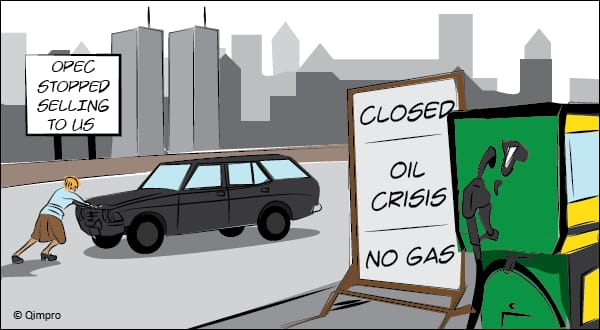Lessons from Past Disruptions

Oil Embargo
The first step in Problem Solving, when there is a disruption in the economic / social / political environment, is to question every assumption we have been working with.
The classic case I can recall is when, in 1973, 12 countries that made up OPEC stopped selling to the United States. This embargo sent oil prices through the roof. Prices more than quadrupled. The embargo contributed to stagflation.
As a cascading effect, all countries were impacted with a massive cost push in operations, purchasing, and marketing.
The country most impacted was Japan.
Japanese Recipe
Japan lacked natural resources, so needed to import almost 80% of input requirements. Cost push.
Japanese citizens did not have buying power. Japan depended on 80% of produce being exported to the United States. Again, a cost push.
This created an emergency. So the Emperor of Japan invited industry leaders to assess the crisis and to find a way out of the crisis. The three points on his agenda were:
1 – What are the assumptions we work with?
- Stable oil price
- Customers purchasing economic lot size quantities.
2 – What has changed?
- The price of oil has quadrupled
- Customer behaviour has changed: They order one of a kind.
3 – What stands between us and the goal of one of a kind?
- Set-up times of machines have a modal value of 10 hours
The Emperor set a national goal: Reduce the modal set-up time for machines from 10 hours to 20 minutes, in 3 years.
Japan overachieved. It achieved a modal value of 18 minutes in 2 years. How? Top-down leaders to workers spoke the same language: Quality Improvement.
With that was born the Toyota Manufacturing System, christened Just-In-Time in the west. The Quality Revolution was put on steroids.
Soon thereafter, inventories almost vanished, thereby reducing the Cost Of Poor Quality (COPQ) at plants. Margins grew healthy.
Competing in the US
In parallel, the demand for fuel efficient cars was born in the United States. The American fuel guzzling cars were uneconomical for individuals and families.
Japan seized the opportunity. Datsun 510 and Toyota Corolla rolled into the United States. At that time these Japanese cars were in a sub-compact edition, namely, 4 cylinders and 2 doors. They grabbed a significant market share
Also, Japanese manufacturers of entertainment electronics could sell their products in the United States, at a price lower than the cost to produce the same locally, in spite of higher logistics costs!
Almost immediately, unknown brand names such as Sony and Panasonic took on the world heavy-weights – RCA, Zenith, Grundig, Bush, Philips. And they were victorious.
Coronavirus Threat
We now have a pandemic. Coronavirus. It is disrupting the way of life, globally.
Should we not question every assumption we have been working with?
I wish to invite you to add to the assumptions we have been working with.
Let me start with:
- Mother Earth is benevolent and forgiving
- ????
Random Thoughts
- To be effective, one has to be proactive
- Survival is not compulsory
- 1% of the population has 95% of the wealth
- We are an interdependent world
- Think local for daily needs
- Are we human beings in search of a spiritual experience?
- Are we spiritual beings having a human experience?

Wow! That is an insightful story! What are the assumptions we have been working with? My thoughts:
2. Automation leads to efficiencies and productivity
3. People at the frontline facing the problem are not capable of solving the problem. They have to escalate it.
4. People can’t be trusted or inspired so need to be controlled or managed
5. Economies of scale
6. Accounting assumptions of allocating overheads.
7. Only 20% of the organisation is Top Talent and need to be nurtured.
8. Tendering leads to lowest costs.
9. Crisis management skill is more important than prevention ( Hero Worship)
10. Jugaad (short term fixes) solve all types of problems.
Ashok…Please prioritize your top 3 ASSUMPTIONS
1.What s the crucial primary aspects of life and its quality ? 2.how should governance therefore prioritize its plans and budgets 3. How to create economic and social nudges to improve social behavior to better living and sensitivity to each others right to quality of life 4. What will be the identified missing governance nudges that lead to complex rules of living and doing business. 5. What are our opportunities to use the relative downgrading of economies to leverage for our economic build up to cater to the new world structure. 6. Is this our chance to emerge back as Sone ki Chidia 7. What should we adopt as minimum social living and community living to eschew social strife and inter societal insecurities that constantly deflect from core goal of development Nd progress ? 8. Is it also time to use the rare unique national unity in this crisis to also build common consensus on population control and environmental hygiene and progress 9. Are there opportunities to leverage ecological conservation as a goal for economic development in villages and the tribal societies ? 10. …so on..If task forces are created around these we may create a 24 month action plan during this quarantine period so that post quarantine a new nation with collective resolve focuses on commonly arrived action plans for new paradigm.of growth. After all there is no better time as the bottom.to rise up taking new decisions away from.legacy thought processes.
Ravi….Please prioritize your ASSUMPTIONS.